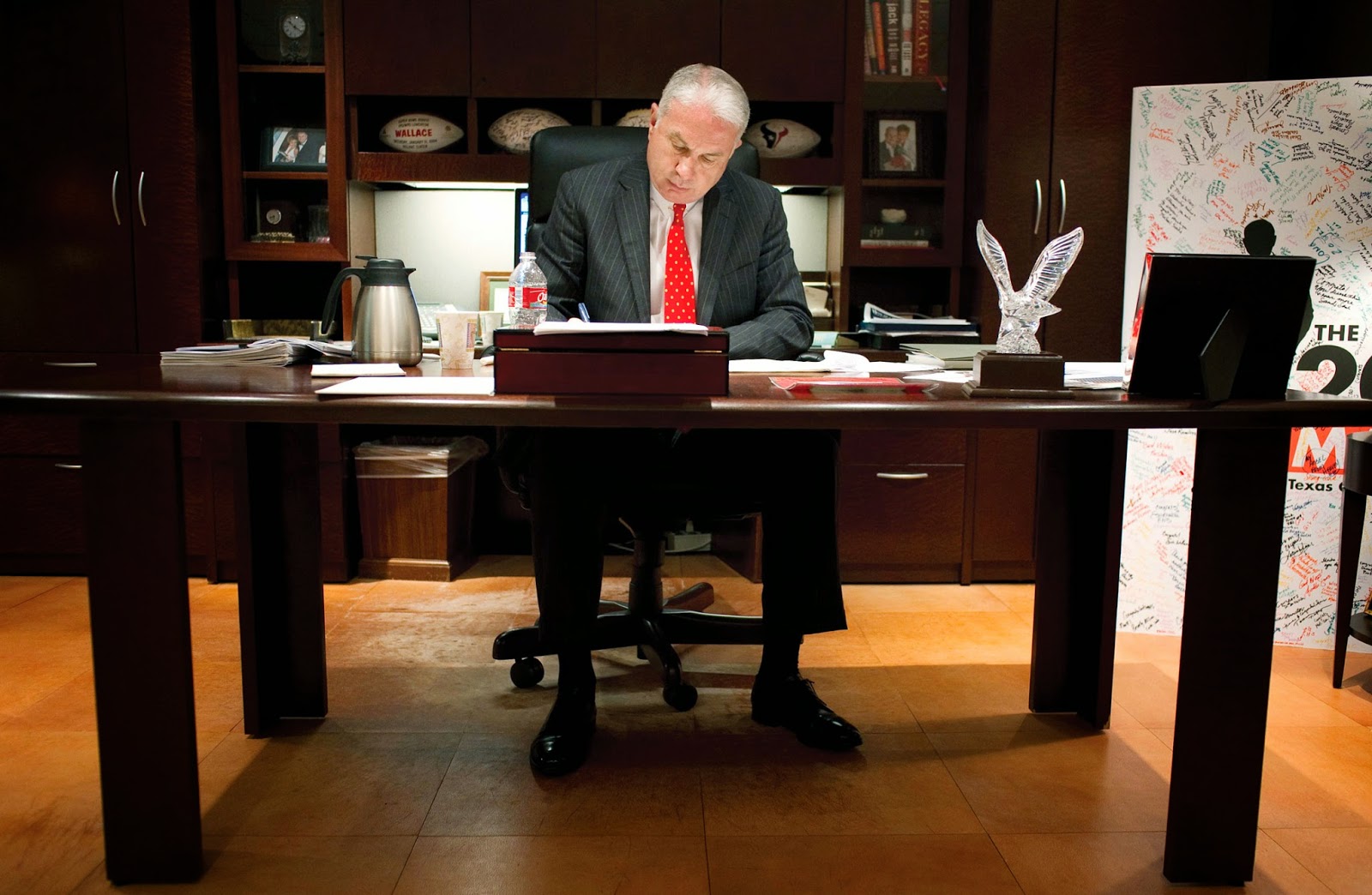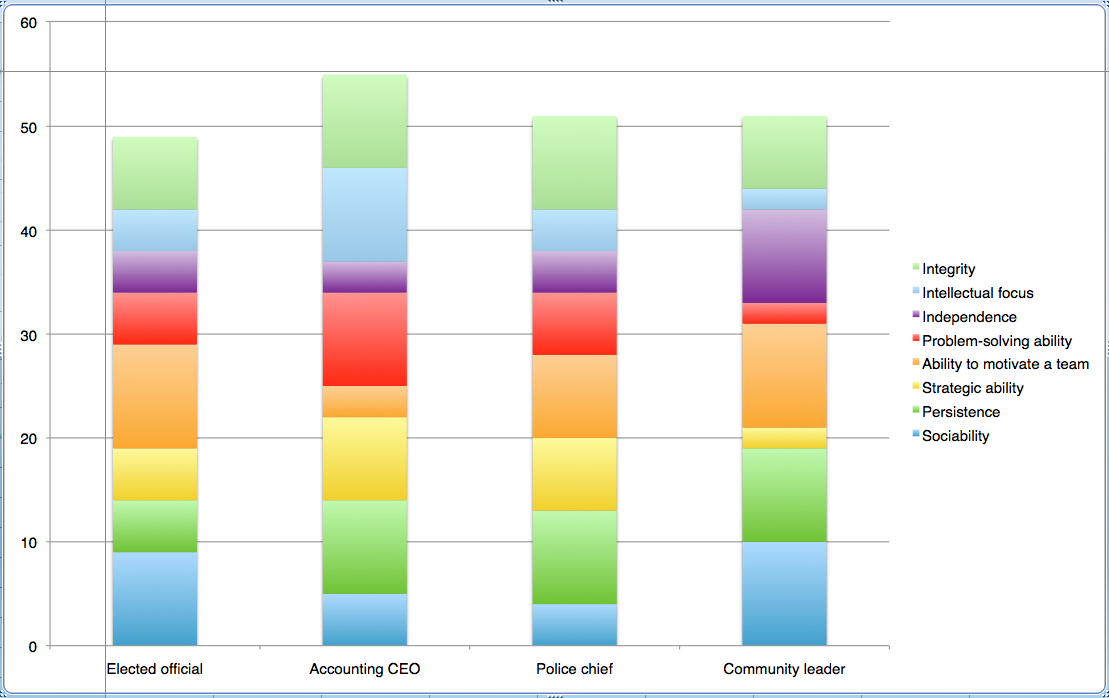Social Sciences


My university work involves quite a bit of interaction with leaders in different sectors of society ? non-profits, elected officials, community organizations, business, law enforcement, and education, for example. Over the years I have noticed some striking differences in profile across sectors in terms of the qualities of mind and character that leaders in these sectors display. We might imagine a small number of traits with scales that are relevant to assessing leadership effectiveness -- perhaps along these lines:

On this set of assumptions, elected officials are high on sociability and team motivation but low on independence and intellectual focus; accounting CEOs are high on persistence, problem-solving ability, intellectual focus, and integrity, but low on team motivation and independence; police chiefs are high on persistence, motivational ability, and integrity, and low on sociability, intellectual focus, and independence; and community leaders are low on strategic ability, problem-solving ability, and focus, but high on the other attributes of leadership. In other words, each group of leaders shows a very different mix of skills and abilities.
(It should be understood that this graph is purely notional. I've assigned impressionistic values to the eight qualities for the four professions, but there is no real empirical measurement involved here. The graph is just intended to illustrate the idea. I am imagining that data for a graph like this would come from personality studies of randomly selected individuals who serve as leaders in the four professions.)
What explains the distinctiveness of leadership profiles in various sectors? The book I like best on the sociology of the professions is Andrew Abbott's The System of Professions: An Essay on the Division of Expert Labor. But Abbott's treatment doesn't address this specific question -- how are individuals socialized into the various professions? So how can we begin to think about the question?
A priori there seem to be at least three relevant mechanisms: selection, training, and peer emulation.
Selection works at several levels in most occupations, including entry and promotion. Individuals enter the sector with specialized training and a wide range of features of personality. The training that is provided for an accountant or a physician inculcates a fairly specific set of mental habits which the young professional brings with him or her into the professional setting. Young practitioners then begin to move up in their organizations. They advance within the organization according to the judgment of more senior managers about their suitability for higher levels of leadership and management. Those judgments are an important source of the specialization of traits of leaders that occurs within organizations. If senior managers believe that good leaders are quick and decisive, then the individuals they promote will tend to have these characteristics. So the ?folk? wisdom within a sector or industry about what makes a good manager is itself an important driver of the composition of the leadership corps.
Sometimes senior leaders are selected through a more complex process involving search consultants and a search committee. This is the model for the selection of most senior university leaders. Here we often find a more complicated mix of selection criteria ? committee members who favor academic achievement, others who favor administrative effectiveness, yet others who favor communications skills and vision. So we might expect that such a process would lead to a more heterogeneous leadership corps. And the selection process for elected officials is more complicated yet. The qualities that lead to success are those that allow the candidate to quickly evoke support from a broad range of potential voters. Some of these qualities have to do with the candidate's public priorities and values; but others have to do with communications and skills and sociability.
Take law enforcement agencies as an example. The qualities that make for a particularly effective street officer or sergeant may allow a given individual to rise through the ranks to a certain level. But the qualities that make for an effective police chief or commander may be somewhat different from the mix for the street-level officer. Perhaps these factors include broad vision of the department?s mission, an exceptional ability to communicate with the public and other public officials, and a special ability to inspire commitment from the men and women in service in the organization. An officer who is a great investigator or a great community policing officer may lack these other broader characteristics. And this means that the selection process for a chief may be one that cultivates the very small percentage of individuals who have the plus factor, even though these individuals' performance at the street or sergeant level is no better than that of their peers.
(Or if you watch The Wire and its depiction of the police command structure of Baltimore, you may think that the traits for which leaders are selected are less high-minded: an ability to curry favor from other powerful people, a willingness to act deceitfully, a willingness to bully subordinates, and an ability to look good in a press conference. Who could be a fan of Deputy Commissioner Bill Rawls in The Wire?)
The training associated with profession or industry is another important source of distinctiveness in leaders in a sector. Human resources professionals undergo professional development and training throughout their careers, from first hire to their most senior appointments. And these training processes build a set of mental frameworks and practices that become ingrained in most or all of the professionals in this field -- including those who go on to positions of senior leadership. The same is true of law enforcement, banking, and medicine. The foundational training for professionals in these fields -- police academy, MBA, medical school -- itself promotes particular ways of thinking about the world and one's responsibilities that are quite distinct across professions. Doctors think differently from police officers. And these differences are deepened by the training experiences each of these professionals have within their own organizations. We may speculate that doctors and architects deepen their professional habitus through their working lives in hospitals and architectural firms, and that these experiences make a significant difference when they become CEOs of organizations in their sectors.
Peer emulation seems to be a third important factor influencing the personality and style of leadership and management of the leaders in a sector or industry. Deans and provosts see a few university presidents in action, and they model their own behavior and aspirations accordingly (to some extent). Bankers, from junior to senior, observe the actions and motivations of their peers, and their own behavior adapts to what they observe. At a recent conference in Stockholm Ernst Fehr presented interesting research using the techniques of experimental economics to probe the mores and character traits of professionals in the banking industry. The research suggests a powerful effect from the environment of a financial institution to the character and behavior of its professionals in a fairly brief period of time. It will be interesting to discuss this research here when it is published.
So perhaps it isn't surprising that police chiefs, mayors, foundation heads, and community leaders have quite distinctive styles do thinking and acting, and make leadership decisions that look fairly different across these different professions. They have been selected and trained in widely different ways, they have been exposed to the practice of other professionals in their field over a range of settings, and they have observed the choices and behavior of leaders whom they either admire or dislike. In the terms that Bourdieu introduced, they occupy a field of practice where behaviors and dispositions are shaped by the activities of others in the field and the latent incentives and messages contained in the field.
Readers -- is there an area of personality psychology (or organizational psychology) that has studied this question in detail? Suggestions are invited.
- Positive Organizational Behavior
source: Rob Cross, Wayne Baker, Andrew Parker, "What creates energy in organizations?" (link) Organizations need study for several important reasons. One is their ubiquity in modern life -- almost nothing that we need in daily life is created by solo...
- 4th Wlec - Women's Leadership And Empowerment Conference 2013
WLEC - Women's Leadership and Empowerment Conference 2013 13-15 March 2013 Bangkok, Thailand Website: http://www.tomorrowpeople.org/womens-leadership-conference-2013.html Dear Scholars,...
- 4th Wlec - Women's Leadership And Empowerment Conference 2013
WLEC - Women's Leadership and Empowerment Conference 2013 13-15 March 2013 Bangkok, Thailand Website: http://www.tomorrowpeople.org/womens-leadership-conference-2013.html Dear Scholars,...
- Pgppm @ Iim, Bangalore
PGPPM 2013: Online Application (Open Candidates) The Post Graduate programme in Public Policy and Management (PGPPM) aims at strengthening the public policy and managerial skills of future leaders and senior managers from the civil services; and ...
- Women's Leadership And Empowerment Conference
WLEC - Women's Leadership and Empowerment Conference 2013 13-15 March 2013 Bangkok, Thailand Website: http://www.tomorrowpeople.org/womens-leadership-conference-2013.html Dear Scholars,...
Social Sciences
Differences in leadership qualities across professions


My university work involves quite a bit of interaction with leaders in different sectors of society ? non-profits, elected officials, community organizations, business, law enforcement, and education, for example. Over the years I have noticed some striking differences in profile across sectors in terms of the qualities of mind and character that leaders in these sectors display. We might imagine a small number of traits with scales that are relevant to assessing leadership effectiveness -- perhaps along these lines:
- Sociability
- Persistence
- Strategic ability
- Ability to motivate a team
- Problem-solving ability
- Independence
- Intellectual focus
- Integrity

On this set of assumptions, elected officials are high on sociability and team motivation but low on independence and intellectual focus; accounting CEOs are high on persistence, problem-solving ability, intellectual focus, and integrity, but low on team motivation and independence; police chiefs are high on persistence, motivational ability, and integrity, and low on sociability, intellectual focus, and independence; and community leaders are low on strategic ability, problem-solving ability, and focus, but high on the other attributes of leadership. In other words, each group of leaders shows a very different mix of skills and abilities.
(It should be understood that this graph is purely notional. I've assigned impressionistic values to the eight qualities for the four professions, but there is no real empirical measurement involved here. The graph is just intended to illustrate the idea. I am imagining that data for a graph like this would come from personality studies of randomly selected individuals who serve as leaders in the four professions.)
What explains the distinctiveness of leadership profiles in various sectors? The book I like best on the sociology of the professions is Andrew Abbott's The System of Professions: An Essay on the Division of Expert Labor. But Abbott's treatment doesn't address this specific question -- how are individuals socialized into the various professions? So how can we begin to think about the question?
A priori there seem to be at least three relevant mechanisms: selection, training, and peer emulation.
Selection works at several levels in most occupations, including entry and promotion. Individuals enter the sector with specialized training and a wide range of features of personality. The training that is provided for an accountant or a physician inculcates a fairly specific set of mental habits which the young professional brings with him or her into the professional setting. Young practitioners then begin to move up in their organizations. They advance within the organization according to the judgment of more senior managers about their suitability for higher levels of leadership and management. Those judgments are an important source of the specialization of traits of leaders that occurs within organizations. If senior managers believe that good leaders are quick and decisive, then the individuals they promote will tend to have these characteristics. So the ?folk? wisdom within a sector or industry about what makes a good manager is itself an important driver of the composition of the leadership corps.
Sometimes senior leaders are selected through a more complex process involving search consultants and a search committee. This is the model for the selection of most senior university leaders. Here we often find a more complicated mix of selection criteria ? committee members who favor academic achievement, others who favor administrative effectiveness, yet others who favor communications skills and vision. So we might expect that such a process would lead to a more heterogeneous leadership corps. And the selection process for elected officials is more complicated yet. The qualities that lead to success are those that allow the candidate to quickly evoke support from a broad range of potential voters. Some of these qualities have to do with the candidate's public priorities and values; but others have to do with communications and skills and sociability.
Take law enforcement agencies as an example. The qualities that make for a particularly effective street officer or sergeant may allow a given individual to rise through the ranks to a certain level. But the qualities that make for an effective police chief or commander may be somewhat different from the mix for the street-level officer. Perhaps these factors include broad vision of the department?s mission, an exceptional ability to communicate with the public and other public officials, and a special ability to inspire commitment from the men and women in service in the organization. An officer who is a great investigator or a great community policing officer may lack these other broader characteristics. And this means that the selection process for a chief may be one that cultivates the very small percentage of individuals who have the plus factor, even though these individuals' performance at the street or sergeant level is no better than that of their peers.
(Or if you watch The Wire and its depiction of the police command structure of Baltimore, you may think that the traits for which leaders are selected are less high-minded: an ability to curry favor from other powerful people, a willingness to act deceitfully, a willingness to bully subordinates, and an ability to look good in a press conference. Who could be a fan of Deputy Commissioner Bill Rawls in The Wire?)
Peer emulation seems to be a third important factor influencing the personality and style of leadership and management of the leaders in a sector or industry. Deans and provosts see a few university presidents in action, and they model their own behavior and aspirations accordingly (to some extent). Bankers, from junior to senior, observe the actions and motivations of their peers, and their own behavior adapts to what they observe. At a recent conference in Stockholm Ernst Fehr presented interesting research using the techniques of experimental economics to probe the mores and character traits of professionals in the banking industry. The research suggests a powerful effect from the environment of a financial institution to the character and behavior of its professionals in a fairly brief period of time. It will be interesting to discuss this research here when it is published.
So perhaps it isn't surprising that police chiefs, mayors, foundation heads, and community leaders have quite distinctive styles do thinking and acting, and make leadership decisions that look fairly different across these different professions. They have been selected and trained in widely different ways, they have been exposed to the practice of other professionals in their field over a range of settings, and they have observed the choices and behavior of leaders whom they either admire or dislike. In the terms that Bourdieu introduced, they occupy a field of practice where behaviors and dispositions are shaped by the activities of others in the field and the latent incentives and messages contained in the field.
Readers -- is there an area of personality psychology (or organizational psychology) that has studied this question in detail? Suggestions are invited.
- Positive Organizational Behavior
source: Rob Cross, Wayne Baker, Andrew Parker, "What creates energy in organizations?" (link) Organizations need study for several important reasons. One is their ubiquity in modern life -- almost nothing that we need in daily life is created by solo...
- 4th Wlec - Women's Leadership And Empowerment Conference 2013
WLEC - Women's Leadership and Empowerment Conference 2013 13-15 March 2013 Bangkok, Thailand Website: http://www.tomorrowpeople.org/womens-leadership-conference-2013.html Dear Scholars,...
- 4th Wlec - Women's Leadership And Empowerment Conference 2013
WLEC - Women's Leadership and Empowerment Conference 2013 13-15 March 2013 Bangkok, Thailand Website: http://www.tomorrowpeople.org/womens-leadership-conference-2013.html Dear Scholars,...
- Pgppm @ Iim, Bangalore
PGPPM 2013: Online Application (Open Candidates) The Post Graduate programme in Public Policy and Management (PGPPM) aims at strengthening the public policy and managerial skills of future leaders and senior managers from the civil services; and ...
- Women's Leadership And Empowerment Conference
WLEC - Women's Leadership and Empowerment Conference 2013 13-15 March 2013 Bangkok, Thailand Website: http://www.tomorrowpeople.org/womens-leadership-conference-2013.html Dear Scholars,...
